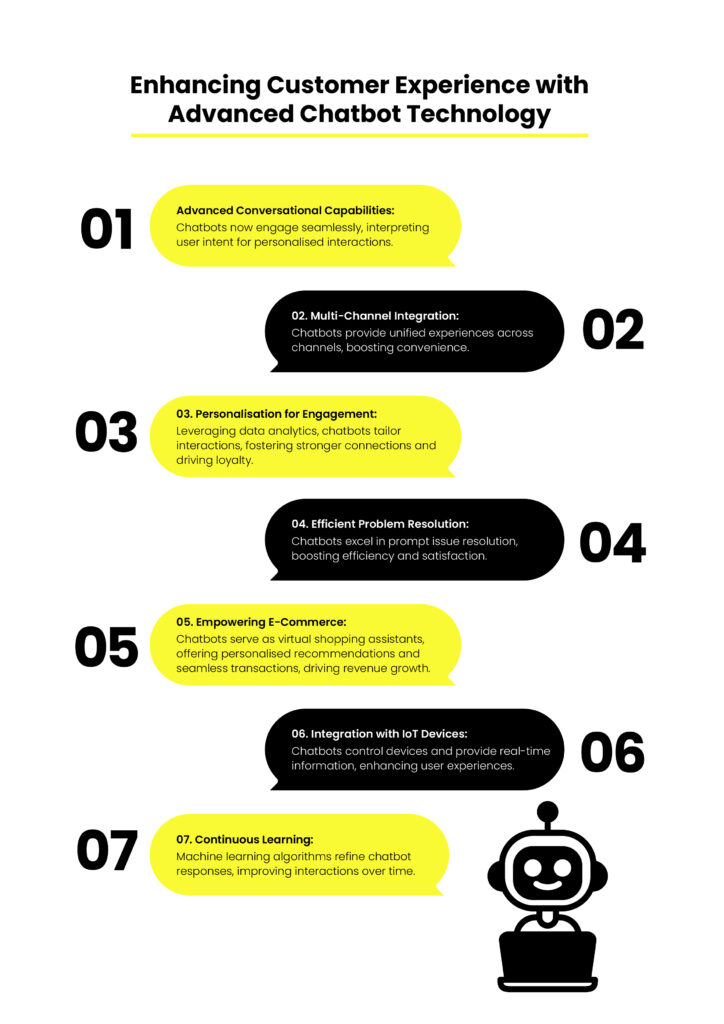Where would we be if chatbots didn’t deliver the follow-up protocol in website campaigns and promotional offers? Surely, marketers would probably be floundering in excessive and obsolete roles. In 2024, chatbots have delivered the stellar customer experience by supplementing the role of adjunct where user queries become their bottom-line powerhouse. Essentially, chatbots receive, iterate and communicate the logistics role like a machine-learning superior.
In today’s digital landscape, chatbots have emerged as powerful tools for businesses to enhance customer satisfaction and streamline operations. Acknowledging the ongoing evolution of chatbots, it’s crucial to understand their impact on customer interactions and the role they play in shaping the overall customer experience.
In this blog, we will highlight the relationship and role of chatbots in enhancing customer experience as of 2024, spotlighting the benefits they provide.
Advanced Conversational Capabilities

With advancements in artificial intelligence and natural language processing (NLP), chatbots have significantly enhanced their conversational skills. These technological advancements enable chatbots to understand and respond to user queries with human-like fluency, facilitating seamless interactions. Through NLP, chatbots can interpret user intent, context, and sentiment, allowing for more personalised and contextually relevant conversations.
Multi-Channel Integration
Chatbots extend their reach across various communication channels, ensuring consistent and engaging conversations regardless of the platform. Whether through websites, mobile apps, social media platforms, or messaging applications, chatbots provide users with a unified experience across channels. By integrating seamlessly into multiple channels, chatbots enable businesses to meet customers wherever they are, enhancing accessibility and convenience.
Personalisation for Improved Engagement
One of the key strengths of chatbots lies in their ability to personalise conversations based on user preferences and history. By leveraging data analytics and machine learning algorithms, chatbots can tailor interactions to each user’s unique needs, preferences, and past behaviour. This personalised approach not only increases engagement but also fosters stronger connections between businesses and their customers, ultimately driving loyalty and retention.
Efficient Problem Resolution
Chatbots excel in addressing customer queries and issues promptly, contributing to streamlined customer support processes. Through instant responses and round-the-clock availability, chatbots ensure that customers receive timely assistance, leading to faster problem resolution and improved satisfaction levels. By automating routine tasks and handling common inquiries, chatbots free up human agents to focus on more complex and high-value interactions, maximising efficiency and productivity.
Empowering E-Commerce Experiences
In the realm of e-commerce, chatbots serve as virtual shopping assistants, guiding customers through their purchase journey and providing personalised recommendations. By leveraging customer data and product information, chatbots offer tailored product suggestions, answer product-related queries, and facilitate transactions seamlessly. This interactive and personalised shopping experience enhances user satisfaction and increases conversion rates, driving revenue growth for businesses.
Ensuring Data Security and Privacy
Businesses must implement robust measures to safeguard customer information, including encryption protocols, data anonymisation techniques, and secure authentication processes. By prioritising data security and privacy, businesses can build trust with customers, mitigating the risk of data breaches and ensuring compliance with regulatory requirements such as GDPR.
Integration with IoT Devices
Chatbots play a pivotal role in enhancing user experiences in IoT ecosystems, particularly in smart homes and offices. By integrating with IoT devices, chatbots can control connected devices, such as smart thermostats, lights, and appliances, through voice commands or text-based interactions. Additionally, chatbots provide users with real-time information about device status, energy consumption, and usage patterns, empowering them to make informed decisions and optimise their smart home or office environment.
Continuous Learning and Adaptation
One of the key strengths of chatbots is their ability to learn from interactions and adapt to changing customer needs. Through machine learning algorithms, chatbots analyse past interactions, identify patterns, and continuously improve their responses over time. By leveraging user feedback and data analytics, chatbots can refine their conversational skills, understand user preferences better, and anticipate future inquiries, leading to more effective and personalised interactions.
Measuring Success Through Analytics
Analytics play a crucial role in measuring the effectiveness of chatbot interactions and optimising performance. Businesses can track key metrics such as conversation completion rates, response times, customer satisfaction scores, and conversion rates to evaluate the impact of chatbots on business outcomes. By analysing these metrics, businesses can identify areas for improvement, refine conversational flows, and optimise chatbot functionality to better meet customer needs and drive desired outcomes.
Ethical Considerations and Transparency
As chatbots become more pervasive in customer interactions, addressing ethical concerns and promoting transparency is essential. Businesses must be mindful of potential biases in chatbot algorithms and ensure fairness and equity in their interactions with users. Moreover, transparency in chatbot interactions, including disclosing the use of AI and providing clear information about data handling practices, helps build trust and credibility with users, fostering positive relationships and enhancing the overall customer experience.
Future Trends and Innovations
Looking ahead, the future of chatbot technology holds exciting possibilities for enhancing customer experiences. Emerging trends such as voice-enabled chatbots, powered by natural language understanding and speech recognition technologies, offer a more intuitive and hands-free interaction experience for users. Additionally, AI-driven personalisation enables chatbots to deliver highly tailored recommendations, content, and experiences, further enriching the customer journey and driving business success. As chatbots continue to evolve, businesses must stay abreast of these innovations to remain competitive and deliver exceptional customer experiences in the years to come.
In conclusion, chatbots have emerged as indispensable tools for businesses seeking to enhance customer experience and drive business success in 2024. From advanced conversational capabilities to personalised interactions and continuous learning, chatbots offer a myriad of benefits for both businesses and consumers alike.
Chatbots are essentially a marketer’s ally in overlooking the social sustenance of a brand’s presence, where they can be programmed to meet the KPI standards and the dynamic scale for which they are built. By embracing ethical practices, prioritising data security and privacy, and leveraging emerging technologies, businesses can harness the full potential of chatbots to create meaningful connections with customers and stay ahead in today’s competitive market landscape. For more on marketing advancements tailored to your business, contact us today!